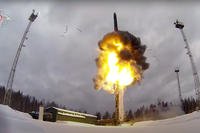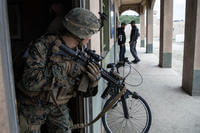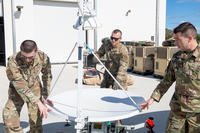UPDATED: Army Leaders "Reviewing" GAO Decisions and BAE Comments On Unique Cab Design
In yet another strike at the heart of the Defense Department's acquisition system, the Government Accountability Office issued a ruling today that the Army made fundamental mistakes when it awarded the Family of Medium Tactical Vehicles (FMTV) contract to Oshkosh.
In the words of one analyst who closely watched this $3 billion competition, "the Army conducted an incomplete, unprofessional review of the proposals from BAE Systems, Oshkosh and Navistar. First, it wrongly stated that all three offerors had equal, excellent production capabilities. Then, on that basis, it picked the winner solely on the basis of price, without a rigorous test as to the realism of Oshkosh's very low bid. So a company that has never built the product beat the incumbent by bidding 30 percent below the current asking price -- on a build-to-print contract! This is the sort of travesty the Weapon Systems Acquisition Reform Act was passed to prevent," said Loren Thompson, defense consultant and analyst at the Lexington Institute.
BAE, incumbent maker of the FMTV, argued publicly that Oshkosh did not possess the expertise or experience to build the FMTV without a high degree of risk to the taxpayer. In particular, BAE pointed to its patented cab design, which allows the addition of armor when needed, as a capability Oshkosh lacked and would have to reinvent or license from BAE. The protestors also argued that Oshkosh's bid price-- 30 percent lower than theirs -- was unsustainable.
“We are confident that our skilled and experienced workforce in Texas and Michigan will put us in the very best position to compete successfully for continued FMTV production, especially since the new Long-Term Armor Strategy cab is our design. Our current bridge takes production through 2010, but decisions need to be made by this spring to sustain uninterrupted FMTV production into 2011. Our workforce remains focused and committed to providing our men and women in uniform with the world’s safest, most reliable medium tactical vehicles," Dennis Morris, president of BAE Systems Global Tactical Systems, said in a Monday statement.
GAO agreed that the Army got the evaluation wrong. "Our review of the record led us to conclude that the Army's evaluation was flawed with regard to the evaluation of Oshkosh's proposal under the capability evaluation factor, and the evaluation of Navistar's past performance," said Michael Golden, GAO's managing associate general counsel for procurement law. But GAO did not agree with the protestors on price. "We also denied a number of Navistar's and BAE's challenges to the award to Oshkosh, including challenges to the evaluation of Oshkosh's price," Golden said in his statement.
GAO "recommended" that the Army reevaluate the proposals in terms of capabilities and conduct a new evaluation of "Navistar's past performance that adequately documents the agency's judgments; and make a new selection decision."
After that, if "Oshkosh is not found to offer the best value, the agency should terminate Oshkosh's contract for the convenience of the government." BAE and Navistar should be reimbursed the substantial costs of their protests. The Army has 60 days to inform GAO of its actions.
Army spokesman Maj. Jimmie Cummings said the service was "aware of the GAO's recommendations and Army leaders are reviewing them at this time."
Following is the GAO's press statement:
DECISION ON BID PROTEST BY NAVISTAR DEFENSE AND BAE SYSTEMS REGARDING ARMY TRUCK AWARD TO OSHKOSH
WASHINGTON, D.C. (December 14, 2009) – The following is a statement by Michael R. Golden, GAO’s managing associate general counsel for procurement law, regarding the bid protest decision resolving the family of medium tactical vehicles protest by Navistar Defense, LLC and BAE Systems, Tactical Vehicle Systems LP, B-401865 et al., December 14,
2009
“Our Office sustained, or upheld, the protests today. Our review of the record led us to conclude that the Army’s evaluation was flawed with regard to the evaluation of Oshkosh’s proposal under the capability evaluation factor, and the evaluation of Navistar’s past performance. We therefore sustained Navistar’s and BAE’s protests.
We also denied a number of Navistar’s and BAE’s challenges to the award to Oshkosh, including challenges to the evaluation of Oshkosh’s price.
We recommended that the Army: reevaluate the offerors’ proposals under the capability evaluation factor, in a manner consistent with the terms of the solicitation; conduct a new evaluation of Navistar’s past performance that adequately documents the agency’s judgments; and make a new selection decision. We also recommended that if, at the conclusion of the reevaluation, Oshkosh is not found to offer the best value, the agency should terminate Oshkosh’s contract for the convenience of the government. We further recommend that Navistar and BAE be reimbursed the costs of filing and pursuing the successful grounds of their protests related to their challenge of technical and past performance evaluation issues, including reasonable attorney fees.
By statute, the Army has 60 days to inform our Office of its actions in response to our recommendations.
Navistar Defense, LLC, of Warrenville, Illinois, and BAE Systems, Tactical Vehicle Systems LP, of Sealy, Texas, protested the award of a contract to Oshkosh Corporation, of Oshkosh, Wisconsin, under request for proposals (RFP) No. W56HZV-09-R-0083, issued by the Department of the Army, U.S. Army Tank-Automotive and Armaments Command, for production of the family of medium tactical vehicles (FMTV). Navistar and BAE challenged the Army’s evaluation of the offerors’ technical and price proposals, and contend that the selection decision was flawed.
The Army received proposals and conducted negotiations with Oshkosh, Navistar, and BAE. The agency selected Oshkosh’s proposal for award on August 26, 2009, and Navistar and BAE each filed a protest with our Office on September 4 and 5, respectively, with each supplementing its protest several times thereafter. In accordance with our Bid Protest Regulations, we obtained a report from the agency and comments on that report from Oshkosh, Navistar, and BAE. Our Office also conducted a hearing on November 9 and 10, at which testimony was received from a number of Army witnesses about the record. Following the hearing, we received further comments from the parties, addressing the hearing testimony as well as other aspects of the record.
Our decision should not be read to reflect a view as to the merits of the firms’ respective approaches to produce the FMTV. Judgments about which offeror will most successfully meet governmental needs are largely reserved for the procuring agencies, subject only to such statutory and regulatory requirements as full and open competition and fairness to potential offerors. Our bid protest process examines whether procuring agencies have complied with those requirements.
The decision was issued under a protective order because the decision contains proprietary and source selection sensitive information. We have directed counsel for the parties to promptly identify information that cannot be publicly released so that we can expeditiously prepare and release, as soon as possible, a public version of the decision.”








